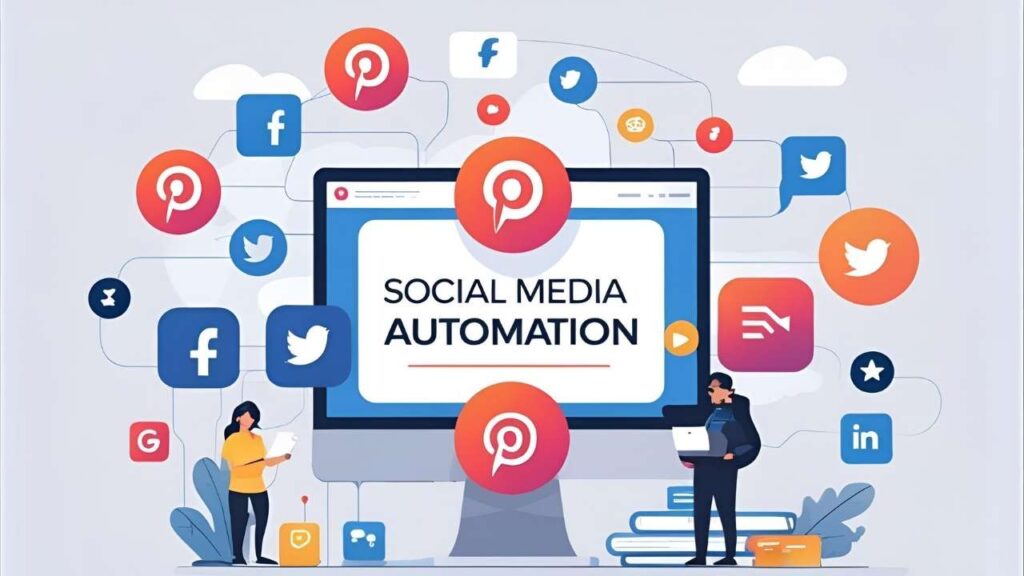The environment of social media marketing has been changing so much as current business organizations are expanding social media platforms and remaining consistent with the people that they target. By 2025, even the average company will present its presence on 6-8 social networks, so it becomes more and more unreasonable and inefficient to manage it manually. Automation of social media has become a solution that allows marketers to have more time to work on other tasks since they can schedule and track post performance and communicate with visitors on social media channels without having to be connected to their devices at all times.
The challenges of manual social media management are multifaceted. Marketers do not know how to post regularly, they are unable to cater to the needs of consumers across time zones, and they cannot monitor the performance levels in various sites and take account of interactions of the audience in a timely manner. These dilemmas tend to result in burnout, lack of brand coherence, and engagement infractions. These platforms are crucial for using SMO tools.
Social media automation platforms are helpful in dealing with these pain points, as they simplify the workflow, maintain regular publishing schedules, offer thorough analytics, and allow for the preparation of significant quantities of content. They also save useful time, increase the level of content consistency, and performance measuring, and enable the marketers to be strategy-oriented instead of monotonous work. To use in this whole analysis, we have ranked platforms with respect to their simplicity of usage, the extensiveness of their features, the price structure, integrations, customer service, and scalability to businesses of various sizes.
Why Social Media Automation Platforms Matter in 2025
The digital marketing landscape of 2025 demands efficiency, consistency, and data-driven decision-making. Social media automation has become indispensable for several key reasons:
Content volume demands
It will take 20-30 posts a day to have a presence on the platform. Manual management is overwhelming, making automation essential for efficiency.
24/7 engagement expectations
Consumers expect constant availability. Automation tools guarantee consistent interaction in terms of scheduled posts and auto-responses even when it is outside the normal business hours.
Rising competition
Inconsistent posting risks losing visibility. Automation assists the smaller brands to compete with larger ones and maintain consistency in their output, as well as produce quality work with few resources.
Need for data-driven strategy
Analytics are an option provided through automation platforms to follow audience behavior, optimize content, and demonstrate ROI, which would be impossible under the assumption of manual management.
Top 10 Social Media Automation Platforms
1. Hootsuite
Website: https://www.hootsuite.com/
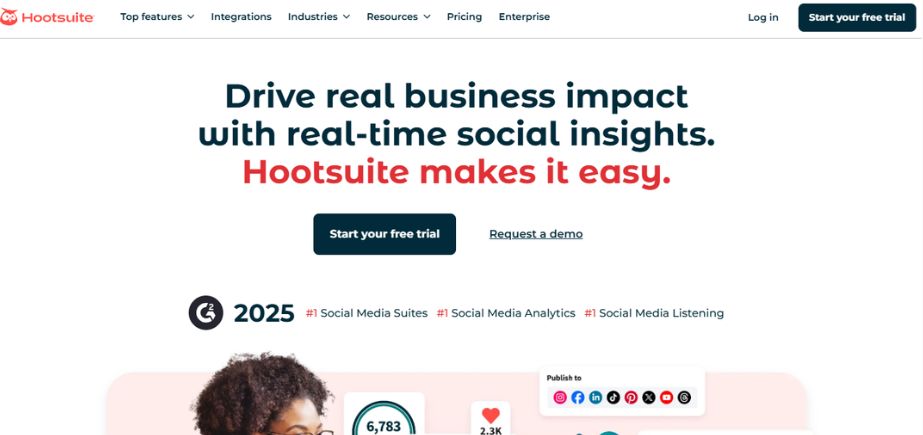
Hootsuite is one of the full-featured social media automation platforms that allows for scheduling, monitoring, and analytics on various networks. It enables its users to schedule and create posts, monitor brand mentions, and analyze performance with the same dashboard. Hootsuite covers such significant platforms as Facebook, Twitter, Instagram, and LinkedIn. It’s ideal for businesses and agencies managing multiple accounts. Although its fully featured products offer premium rates, its strength in integrations and its scalability make it the preferred martech tool of enterprise-level marketers.
Key Features:
- Advanced scheduling dashboard with drag-and-drop functionality
- Team collaboration tools with role-based access controls
- Social listening for brand mentions and competitor monitoring
- Comprehensive analytics with customizable reports
- Over 100 third-party app integrations
Pros:
- Extensive platform support covering all major social networks and many niche platforms
- Robust enterprise features with advanced security and compliance capabilities
Cons:
- Steeper learning curve compared to simpler alternatives
- Higher pricing tiers may be prohibitive for small businesses and startups
Pricing:
Plans start at ₹1915/month for professional use, with enterprise solutions available through custom pricing.
Ideal Users:
Large enterprises, marketing agencies, and established businesses requiring comprehensive social media management with advanced collaboration features.
2. Buffer
Website: https://buffer.com/

Buffer is a simple and neat social media tool that is easy to use. It helps them to plan the posts, measure their performance, and control the engagement within such social networks as Twitter, Instagram, Facebook, and LinkedIn. Features of Buffer are that it has a publishing queue, works as a team, and has simple analytics. It’s ideal for small businesses, solopreneurs, and content creators. Buffer presents a free version and inexpensive paid plans, which makes it affordable to users with less funding and fewer requirements.
Key Features:
- Intuitive content queue with drag-and-drop scheduling
- Optimal timing algorithm for AI-powered posting
- Visual content planning with image and video preview
- Performance analytics with easy-to-understand dashboard
- Browser extension for seamless content curation
Pros:
- Exceptionally user-friendly interface with minimal learning curve
- Affordable pricing structure suitable for small businesses and individuals
Cons:
- Limited advanced features compared to enterprise-focused platforms
- Fewer integration options with third-party tools and services
Pricing:
Free plan available for basic use, paid plans start at $6/month per social channel.
Ideal Users:
Small businesses, solopreneurs, and marketing beginners who prioritize simplicity and affordability over advanced features.
3. Later
Website: https://later.com/
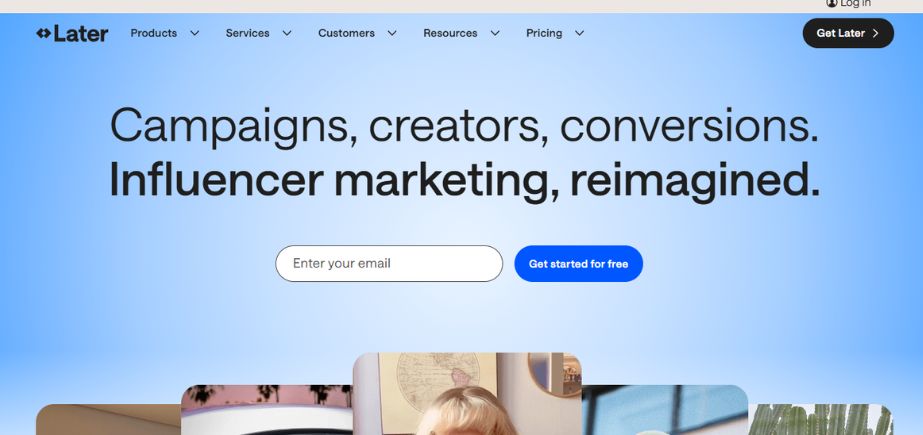
Later is a techie-centered social scheduling tool visually built around Instagram, although it also caters to the platforms TikTok, Pinterest, Facebook, and LinkedIn. It has a drag-and-drop content calendar, media library, and Instagram preview grid. Later is perfect in instances when a brand focuses more on visual content, such as fashion, food, and a lifestyle niche. The platform also offers hashtag suggestions and performance analytics. Later can be used by influencers and creators as well as small marketing teams, both in its free and paid versions.
Key Features:
- Visual content calendar with drag-and-drop planning
- Media library with comprehensive asset management
- Link in bio tool for shoppable Instagram posts
- User-generated content discovery and curation tools
- Video and Story scheduling for Instagram content
Pros:
- Superior visual content planning and Instagram-specific features
- Excellent mobile app functionality for on-the-go content management
Cons:
- Limited functionality for text-heavy platforms like Twitter and LinkedIn
- Fewer analytics capabilities compared to comprehensive platforms
Pricing:
Free plan available, paid plans start at $25/month for additional features and platforms.
Ideal Users:
Visual brands, Instagram-focused businesses, e-commerce companies, and content creators who prioritize visual storytelling.
4. Sprout Social
Website: https://sproutsocial.com/
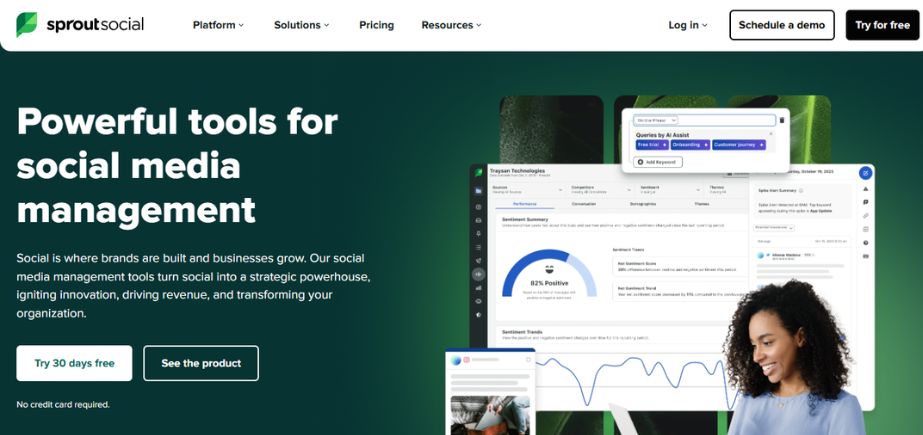
Sprout Social provides a robust mix of social media applications, including publishing, engagement, analytics, and CRM applications. It is compatible with the leading systems and provides consolidated inboxes, audience reports, and social monitoring. Sprout is well known as a comprehensive analytics and collaborative software, and it suits big and medium-sized enterprises and agencies. It is more expensive, but it offers good value to teams that require complex insights and automation of workflows in a centralised setting.
Key Features:
- Smart inbox for unified message management
- CRM integration with customer relationship tools
- Advanced analytics with competitive analysis
- Social listening with brand monitoring and sentiment analysis
- Team collaboration with workflow management
Pros:
- Exceptional customer service and community management features
- Comprehensive analytics and reporting capabilities with actionable insights
Cons:
- Higher pricing point compared to basic automation tools
- May be overwhelming for users who only need basic scheduling functionality
Pricing:
Plans start at $199/month for small teams, with enterprise pricing available.
Ideal Users:
Customer service-focused businesses, community managers, and companies requiring advanced social CRM capabilities.
5. Zoho Social
Website: https://www.zoho.com/social/
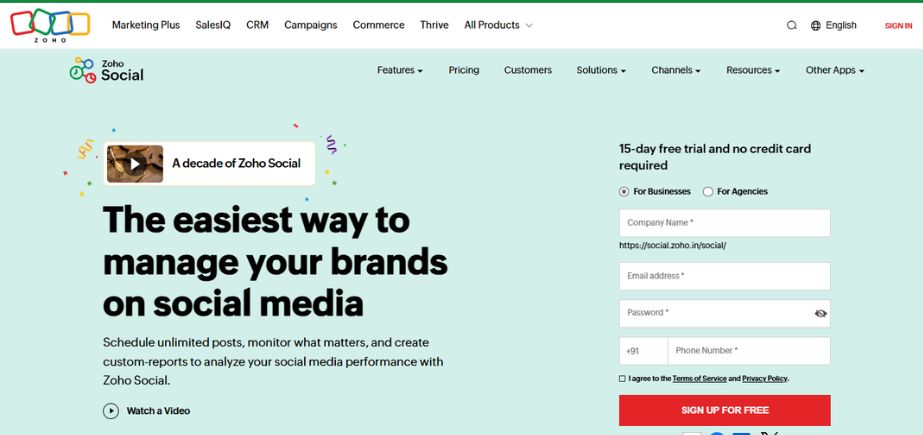
Zoho Social, a social media management tool, is an inexpensive tool with module support that includes post scheduling, monitoring, analytics, and team collaboration. It is also easy to integrate into Zoho CRM and marketing suite, so it is also a good decision in case a business is already using Zoho products. It is easy to use by users and allows multiple brands and report customization. It is compatible with all the major networks and has real-time monitoring of engagement. The software fits in the category of small to medium-sized enterprises that need cost-effective bundled social media applications.
Key Features:
- Publishing calendar with bulk upload capabilities
- Social listening with brand monitoring and keyword tracking
- Team collaboration with multi-user access and role-based permissions
- Analytics dashboard with customizable reports and metrics
- Seamless integration with Zoho CRM, Mail, and other business applications
Pros:
- Excellent value for money with comprehensive feature set
- Strong integration with Zoho’s business application ecosystem
Cons:
- Limited third-party integrations outside the Zoho ecosystem
- Interface design may feel dated compared to more modern alternatives
Pricing:
Plans start at ₹900/month for basic features, with advanced plans available at higher tiers.
Ideal Users:
Existing Zoho users, small to medium businesses seeking affordable comprehensive social media management.
6. SocialBee
Website: https://socialbee.com/
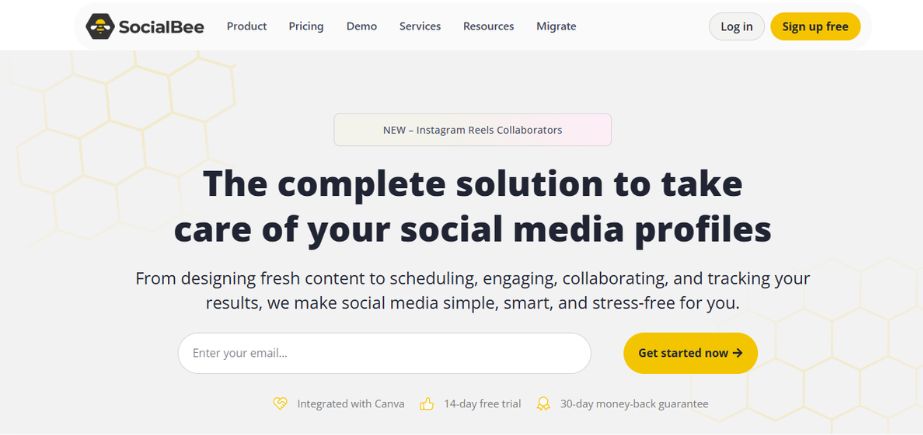
One such scheduling tool is SocialBee, and this is a social media recycling and scheduling tool that was designed to ensure that its users are consistent on a daily basis with their posting schedules. It also supports category-based scheduling, content importation functionality, and Canva and URL shortener integrations. Users can control the posts on Facebook, Twitter, Instagram, LinkedIn, and so on. It is strong in evergreen content automation and workflow management. SocialBee works best with solopreneurs, consultants, and small teams that want to make maximum content reach with minimum effort.
Key Features:
- Content categorization with advanced tagging system
- Evergreen content recycling with automated reposting
- RSS feed integration for automatic content curation
- Audience growth tools with automated following and engagement
- Performance analytics with category-based insights
Pros:
- Excellent content recycling capabilities that maximize content ROI
- Strong focus on organic audience growth and engagement
Cons:
- Smaller platform support compared to major competitors
- Limited advanced analytics and reporting features
Pricing:
Plans start at $29/month for basic features, with higher tiers offering additional platforms and features.
Ideal Users:
Content-heavy businesses, bloggers, and companies with extensive evergreen content libraries.
7. MeetEdgar
Website: https://meetedgar.com/
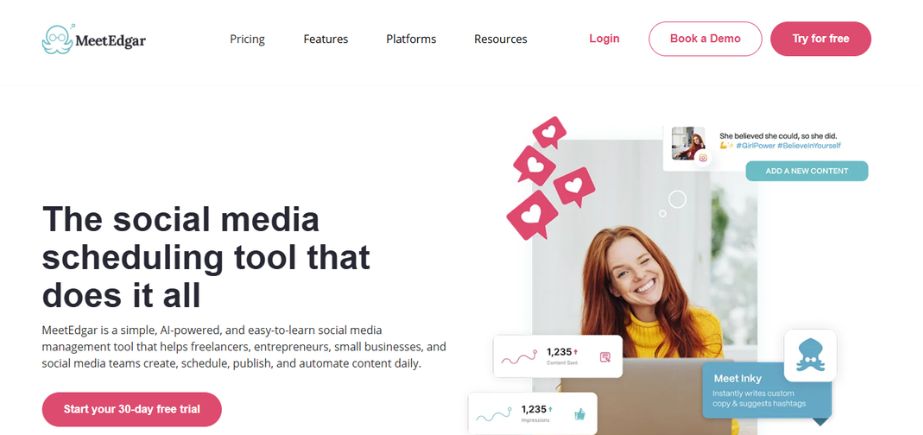
MeetEdgar is a service that automatically posts on social media and recycles the evergreen information, and gets you new social posts through AI. It includes the categories and rotates posts to ensure permanent involvement. The platform is of particular use to companies having a small budget when it comes to creating content. MeetEdgar supports platforms like Facebook, Twitter, LinkedIn, and Instagram. Although it is not the best solution to perform complicated analytics or to have a big team, it works perfectly well with solopreneurs and small companies that need their social media strategy simplified and automated.
Key Features:
- Automatic content recycling with intelligent reposting system
- Content library management with comprehensive categorization
- Variation testing with A/B testing capabilities
- Auto-scheduling that adapts to audience engagement patterns
- Performance tracking focused on content recycling effectiveness
Pros:
- Industry-leading content recycling capabilities that maximize content lifespan
- Time-saving automation that reduces manual content management requirements
Cons:
- Limited platform support compared to comprehensive alternatives
- Fewer advanced features for businesses requiring sophisticated social media management
Pricing:
Single plan at $29.99/month with all features included.
Ideal Users:
Content marketers, small businesses with limited content creation resources, and anyone seeking to maximize their content investment.
8. Publer
Website: https://publer.com/
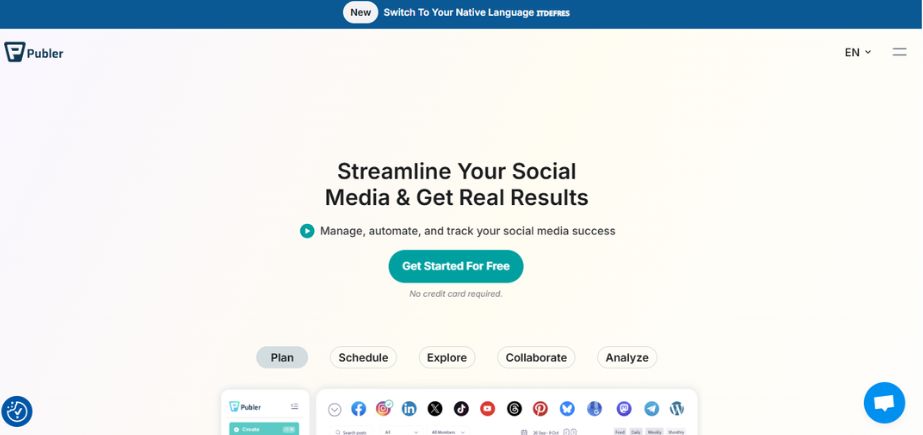
Publer is a powerful social media planner that allows arranging the content, automating and analyzing it on Facebook, Instagram, LinkedIn, Twitter, Pinterest, TikTok, and YouTube. It provides such features as bulk scheduling, social media link in bio, social media post recycling, and Instagram scheduling. Publer has inbuilt editing as well as AI captioning. No strings attached to its free account, Publer is also affordable and well-suited to freelancers, creators, and small companies that need flexibility and control over their multiple platforms’ content strategy.
Key Features:
- Bulk scheduling with CSV import and bulk upload capabilities
- Auto-posting with intelligent scheduling and optimal timing recommendations
- Team collaboration with multi-user access and role-based permissions
- Analytics dashboard with performance tracking and engagement metrics
- Full-featured mobile application for content management on-the-go
Pros:
- Modern, intuitive interface with excellent user experience
- Competitive pricing with generous feature offerings
Cons:
- Newer platform with smaller user community and fewer resources
- Limited advanced features compared to established enterprise platforms
Pricing:
Get a quote
Ideal Users:
Small to medium businesses, modern marketers who value user experience, and teams seeking affordable automation solutions.
9. CoSchedule
Website: https://coschedule.com/
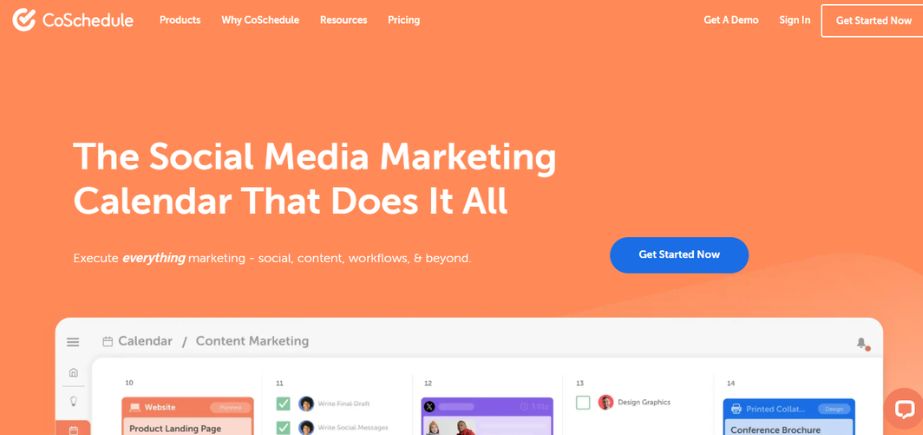
CoSchedule also enables integration of content calendar and social media scheduling, thus it is perfect in the event that it is required by a marketing individual to plan a unified campaign. It is integrated with WordPress, HubSpot, and email marketing, and offers a holistic marketing working hub. CoSchedule’s ReQueue feature recycles top-performing posts for continuous engagement. It is an ideal tool to be used by a team that can manage blogs, emails, and social campaigns all in a single location. Although it is not as niche (marketing-wise) as other competitors, it works great when it comes to content-driven companies and editorial departments.
Key Features:
- Marketing calendar that integrates social media with other marketing activities
- Content organization with project management features for coordinating campaigns
- Team collaboration with advanced workflow management and task assignment
- Analytics integration connecting social media metrics to broader marketing goals
- Asset management with centralized storage and organization system
Pros:
- Excellent integration between social media and broader marketing planning
- Strong project management capabilities for coordinating complex campaigns
Cons:
- May be overly complex for businesses only needing basic social media automation
- Higher learning curve due to comprehensive feature set
Pricing:
Plans start at $19/month for basic features, with higher tiers offering advanced functionality.
Ideal Users:
Marketing teams, agencies, and businesses requiring integrated marketing calendar management alongside social media automation.
10. Sendible
Website: https://www.sendible.com/
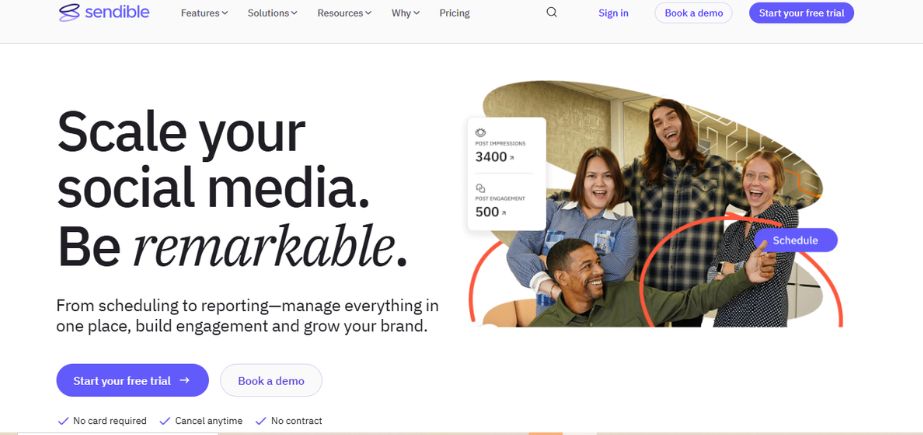
Sendible is one of the many social media automation platforms that specializes in agencies and team management. It is compatible with all large social networks and provides comprehensive functionality, such as post scheduling, social listening, analytics, and client approval orders. The tool is also easy to use since it can connect with Canva, Google Drive, and Dropbox, allowing you to manage media easily. The dashboard can be customized to a great degree, and because of Sendible CRM, the interaction with the audience can be personalized. It is most suitable for agencies that deal with various clients and require scalable and white-label social media offerings.
Key Features:
- White-label solution with customizable branding options for agencies
- Client management with comprehensive tools for multiple client accounts
- Advanced scheduling with sophisticated content calendar and bulk scheduling
- Reporting dashboard with customizable reports and white-label options
- Team collaboration with advanced user management and client-specific access
Pros:
- Excellent agency-focused features with white-label capabilities
- Strong client management tools for handling multiple accounts efficiently
Cons:
- May be unnecessarily complex for individual businesses or small teams
- Higher pricing reflects agency-focused feature set
Pricing:
Plans start at $29/month for small agencies, with enterprise pricing available for larger operations.
Ideal Users:
Marketing agencies, freelancers managing multiple clients, and businesses requiring white-label social media management solutions.
Comparison Table Between Social Media Automation Platforms
| Platform | Starting Price | Best Use Case | Key Strength | Supported Platforms |
| Hootsuite | ₹1915/month | Enterprise | Comprehensive features | 35+ platforms |
| Buffer | $6/month | Beginners | User-friendly | 8 major platforms |
| Later | $18/month | Visual brands | Instagram focus | 6 major platforms |
| Sprout Social | $199/month | Customer service | CRM integration | 10 major platforms |
| Zoho Social | ₹900/month | Zoho users | Ecosystem integration | 9 major platforms |
| SocialBee | $19/month | Content recycling | Evergreen content | 5 major platforms |
| MeetEdgar | $49/month | Content maximization | Auto-recycling | 4 major platforms |
| Publer | Get a quote | Modern teams | User experience | 7 major platforms |
| CoSchedule | $29/month | Marketing teams | Calendar integration | 6 major platforms |
| Sendible | $29/month | Agencies | White-label solutions | 24 platforms |
Use Case Recommendations of Social Media Automation Platforms
Best for Startups:
Buffer and Publer are the most affordable social media automation platforms for startups that do not have huge budgets. Buffer has a free plan that is sufficient to start working, and Publer has a recent opportunity to get new features at reasonable costs. The two platforms are scalable to meet the business growth.
Best for Agencies:
Sendible and Hootsuite lead in agency-focused features. Sendible is most suitable for agencies that have many clients and wish to white-label the product and client-management related services, whereas Hootsuite has features that suit complex agency operations on many platforms.
Best for Solo Entrepreneurs:
Later and SocialBee work best with solo creators and entrepreneurs. The visual planning solutions provided by Later are an adequate choice among Instagram-centric business people, and SocialBee, with its content recycling capabilities, allows entrepreneurs to utilize the limited amount of content creation capabilities.
Best for E-commerce Businesses:
Later and Sprout Social excel in e-commerce support. The shoppable post characteristics and visual display of products offered by Later, as well as the customer support tools provided by Sprout Social, are also very beneficial to online retailers.
Best for Content-Heavy Brands:
MeetEdgar and SocialBee are useful when brands need to multiply their content investments. Automatic recycling in MeetEdgar makes sure that evergreen content keeps creating value, and the categorization system by SocialBee allows sorting large libraries of content efficiently.
Conclusion
The automation industry of social media in 2025 provides its services on a highly advanced level in serving businesses of any size, with their own strengths and specifications. The platforms under consideration prove that effective automation is more than mere scheduling; it involves marketing management in all its aspects, customer relationship building, and optimization using data.
Digital marketing has become competitive to the point where automation makes it possible to sustain a competitive advantage. By using these tools, companies keep their brands mainstream, interact with consumers in an effective way, and quantify their performance whilst they save time to work on other important tasks, i.e, strategic planning and creativity.
Selection of the social media automation platforms would ultimately rely on certain business requirements, team strength, the amount of content, and the area of focus of the platform.
Companies use all-in-one tools such as Hootsuite and Sprout Social, whereas small businesses can use Buffer or Publer. Later is one that visual brands should consider, whereas agencies need special tools such as Sendible.
Most of the platforms allow businesses to test them on a free basis before making a final decision. Practical exposure will tell us which interface will be most familiar to use and which functions will suit indigenous users with existing workflows, and finally, which platform can be used most conveniently with the ongoing business processes. This is because the investment in a proper social media automation platforms will be worth the returns in terms of enhanced efficiency, effective engagement, and quantifiable marketing outcomes.
FAQs
1. What does social media automation refer to?
Social media automation is the process by which software is applied to schedule, publish, and manage social media content across different networks without human effort. It has features like scheduling services, tracking communiques, tracking performance, and communicating with the audiences using automated responses and workflows.
2. Would these appropriate social media automation platforms fit any social sites?
Most automation tools are compatible with major platforms such as Facebook, Instagram, Twitter, LinkedIn, and YouTube. Coverage is, however, platform-dependent, so some tools have wider support than others. Check the support of your favorite platforms whenever you are considering a tool.
3. Will social media automation platforms allow me to auto DM or auto-comment?
Automated posting is possible in most platforms other than direct message posting and commenting, as this is limited by platform policy. Most tools provide notification and response templates, but real engagement can form a significant part of the equation because human engagement is generally needed and is more likely to be in line with the platform requirements.
4. What is the analytics tool to use?
Sprout Social and Hootsuite have the best analytics feature, which has extensive reporting, competitive analysis, and metrics options. The answer can be found in your needs, though Later has Instagram-driven analytics that visual brands may like, and the agencies may be more in need of Sendible white-label reporting.
5. Are free social media automation platforms worth it?
The free versions may be useful in testing the platform and fulfilling the basic needs, but these often have restrictions on either the posts, platforms, or Users. The free plan of Buffer is also quite generous when it comes to rookies, and the rest of them provide quite a decent set of free features. Take free versions as points of departure, but not for business expansion. There is no point in thinking of free versions as long as it takes you to grow your business

